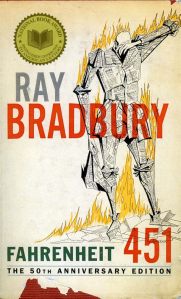Title: Fahrenheit 451
Author: Ray Bradbury
Genre: Classic/Dystopian
Trigger Warnings: Fire, fire injury, death, suicide attempt, murder, needles (mentions)
Back Cover:
Guy Montag is a fireman. In his world, where television rules and literature is on the brink of extinction, firemen start fires rather than put them out. His job is to destroy the most illegal of commodities, the printed book, along with the houses in which they are hidden.
Montag never questions the destruction and ruin his actions produce, returning each day to his bland life and wife, Mildred, who spends all day with her television ‘family’. But then he meets an eccentric young neighbor, Clarisse, who introduces him to a past where people did not live in fear and to a present where one sees the world through the ideas in books instead of the mindless chatter of television.
When Mildred attempts suicide and Clarisse suddenly disappears, Montag begins to question everything he has ever known.
Review:
I read this book in high school, but I remembered literally nothing about it – to the point where I didn’t even remember I read it until I found it on my list of books I’d read in 2011. I also apparently rated it 3 stars on Goodreads, and I wish I’d written a review because I’m curious what I thought about it ten years ago.
My rating this time around is going to be 2.5 (because I use The StoryGraph and it lets me do half stars). I can see why this book became a classic, but it is so, so boring.
The main plot in this story is Guy, the protagonist, is a fireman whose job is to burn books because owning books is illegal. He meets a teenage girl who lives next door and is weird because she likes to think and it gets him to think (and I was very, very relieved that the book did not go the 30-year-old man starts a relationship with a 16-year-old girl route because it felt like things were headed that direction for a while). He saves a Bible from a house that he burned, reads it, and absolutely loses his mind that books say things. Then he torpedoes his entire life because he doesn’t know how to deal with the fact that he read a book.
I mainly was frustrated with him because he just could not keep his cool. Perhaps that’s just because I’m very good at acting normal even when my emotions are a disaster, but I couldn’t relate to or understand his inability to keep his mouth shut. Being found possessing books means you’re arrested and your house is burned to the ground, yet Guy could not stop showing his illegal books to everyone. Like, for heaven’s sake, dude, how are you so incapable of just not telling everybody you’re breaking the law?
This book does have some poignant things to say, which is probably why it became a classic. One of the main themes is how modern people don’t want to think for themselves or have to consider any moral grey areas, they want to be told the right opinions to have and be consuming mindless entertainment constantly – which is a tendency I’ve noticed in my own life, despite the fact that I also adore books. The other themes, though, seem to be “Guy is an idiot” and “the old classic books are infinitely valuable.”
Which brings me to an interesting theme of all three classic dystopian books I’ve read (Fahrenheit 451, Nineteen Eighty-Four, and Brave New World) – they’re all worshiping at the feet of the old classics of the Western canon. Nineteen Eighty-Four is the most subtle (with the protagonist simply part of the government office that rewrites the classics to fit the Party’s platform), but all three seem to have this belief that this canon of classic books is of infinite worth, society knowing the classics will prevent all tyranny, and it is worth dying to preserve them. Which is wildly bizarre to me. I deeply love a great many books, but I don’t think any book is so valuable that it is worth preserving at the cost of human life. And having four years of high school English where everyone is forcibly exposed to Shakespeare doesn’t seem to have fixed anything about American society.
Although the protagonists are the special ones who comprehend the great ideas behind the worshiped Old Classics, so maybe the moral is actually that the common folk just need to let the intellectual elite be in charge and that will solve all our problems. Either way, it’s not a moral I particularly agree with.
I get why Fahrenheit 451 became a classic, because it does have one good thing to say and its dystopian society was a new idea when it was published. But the only plot is Guy not being able to handle that he read part of a book, and that’s not much of a plot at all. The descriptions were also on the excessive side and several times I forgot what was being described before the description finished. In my opinion, not worth the read.

